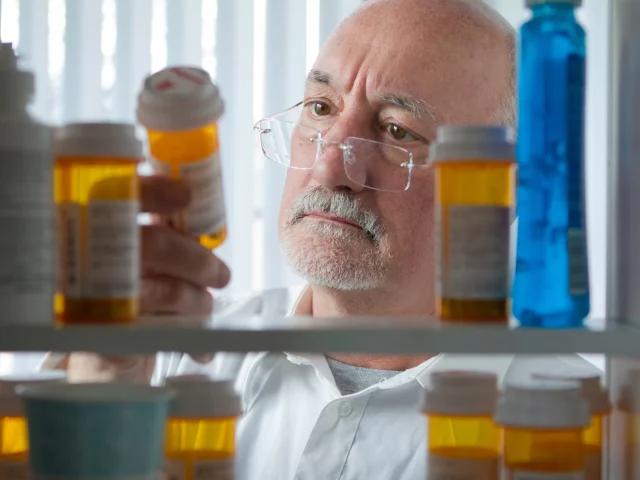When to Get Rid of Your Medicines—and the Best Way to Do It

Most people have a stash of old medications sitting in a drawer or cabinet, but keeping expired or unneeded medications can be risky. Some drugs lose their effectiveness over time, while others can become harmful. Keeping unneeded medicines also increases the chance of someone misusing them or taking them accidentally, which can lead to serious health risks.
Here’s what you need to know about getting rid of old medication to keep everyone safer.
When to Get Rid of Medicines
Expired or unneeded drugs can be dangerous, ineffective or lead to accidental misuse. It’s best to check your medicine cabinet regularly and get rid of anything that’s no longer safe to use. Get rid of a medicine when:
- It’s past its expiration date. Medications can lose potency over time and some may even become harmful after they expire.
- Your doctor changes your prescription. Holding onto old prescriptions might seem harmless, but it increases the chance of taking the wrong medication later, which can cause health issues.
- The treatment is over. If you feel better and your doctor says you can stop taking a medicine, there’s no reason to keep any extra medication that’s left.
- Over-the-counter (OTC) medicines are no longer needed. Unused cold medicine, pain relievers and other OTC drugs may not be safe to take after a certain time.
How to Dispose of Medicines Safely
Certain disposal methods help prevent misuse, protect others and keep harmful substances out of the environment. Here are some options for getting rid of unneeded medications:
- Drug take-back programs. The best way to get rid of old medicines is through take-back programs. Many pharmacies, hospitals and community organizations offer collection sites where you can safely drop off unwanted medications. This ensures they are disposed of properly and don’t end up in the wrong hands.
- Place in the trash. You can throw most medicines in the trash at home, but take extra precautions to do it safely. Before placing medicine in the trash, mix it with something unappealing, such as coffee grounds, cat litter or dirt, and place the mixture in a sealed bag or container. Immediately dispose of the trash – don’t leave it sitting around inside your house.
- Flushing medicines. Some medicines are especially dangerous if taken by someone other than the person prescribed. This includes certain pain medications and other high-risk drugs. Flushing medicine is one way to ensure it won’t be accessed by others who shouldn’t be taking it, but it should only be done when recommended as it can harm the environment.
Other Tips for Safe Medicine Use
Here are a few other things to keep in mind when it comes to safely managing medications:
- Store medicines properly. Keep medications in a cool, dry place, out of the reach of children and pets. Avoid storing medicine in bathrooms, where heat and moisture can affect them.
- Never share prescription medicines. Even if someone has similar symptoms, what works for you might not be safe for them. Always check with a doctor before taking any prescription drugs.
- Check medicines regularly. Every few months, go through your medicine cabinet and remove anything that is expired or no longer needed.
Copyright 2024-2025 © Baldwin Publishing, Inc.. Health eCooks® Heart Healthy Recipes® is a registered trademark of Baldwin Publishing, Inc. Any duplication or distribution of the information contained herein without the express approval of Baldwin Publishing, Inc. is strictly prohibited.